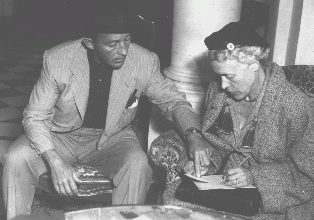Page 1
[Begin Tape 1, Side A]
Biagi: We're supposed to start at the very beginning, so if you want to just talk to me first about where you were born and how your life started, that's terrific.
Beebe: I'm sorry I wasn't born in a log cabin or anything. Middle-class, middle west, WASP background. I came across, going through all this junk, a picture of my mother's graduation from this Ohio college in 1890, just 100 years ago in June. I have it in there. I can also show you a picture of her house in Indiana and where my father grew up in Illinois, which was near Galena, and the family knew Grant.
Biagi: What do you remember most about your mother?
Beebe: Oh, if I start on Mother! I'm sorry you couldn't interview her, because she had real distinction. She was going to be a musician, and instead she was a music teacher and married Father and brought up her family, as one did. She hated to cook, but she did it. [Laughter.] She even sewed and made my clothes and had never learned how at all, because they had help at home.
Then when I was in college, she had a banking career at my father's suggestion. He was the idea man. She went to this bank. It was the First World War. She'd always done the household finances; Father didn't like math, but Mother did. She had done it. Women were having money. For the first time they were working then. So she said, "How do I do it?" He said, "Well, it's always well to go to the biggest person and the biggest thing."
So she tried for an appointment with the biggest man in the biggest bank in Kansas City. Took her quite a while to get to him. I don't know how long she worked at it, but she got there. Like bullets, she gave her ideas about this. He said, "You interest me very much. Make another appointment with my secretary." It took her three or four months to get it. She didn't know anything about banking, you know.
Biagi: And she'd never been in banking before?
Beebe: No, no!
Biagi: And she had never worked before outside the home?
Beebe: No. Well, just schoolteaching for a year or two. So she was sort of a publicity person, I guess. She wrote longhand letters to everybody. She knew everybody in town and joined all the clubs and made speeches about family allowances. She always was serious about that. We always had allowances. Father started the children to learn about money. Inside of a year, she had doubled the deposits from women in the bank, and after that, of course, she went up to

